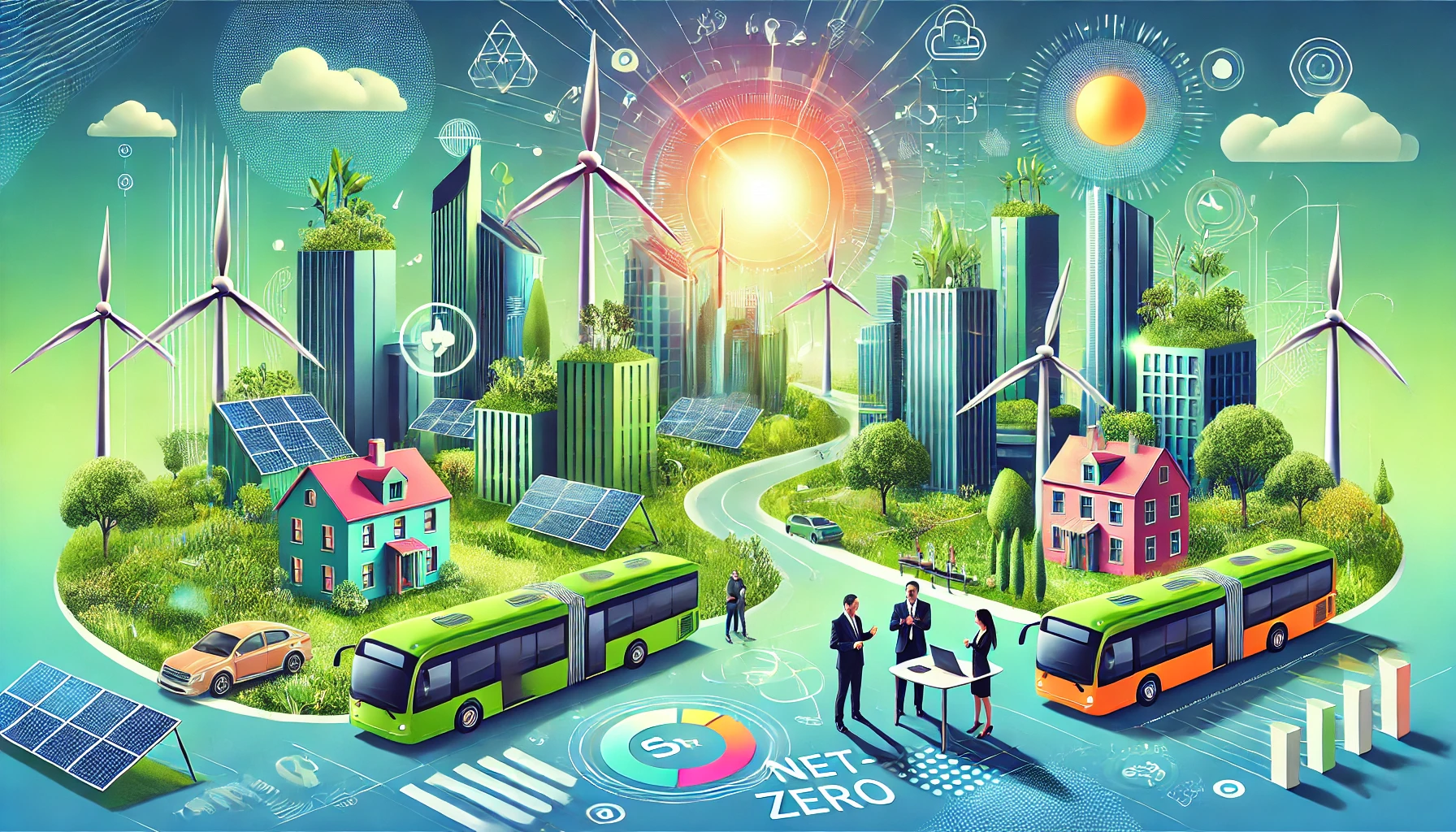As the world faces escalating climate challenges, achieving net-zero emissions has become a pivotal goal for businesses globally. With over 90% of the world’s GDP covered by net-zero pledges (Net Zero Tracker 2023), organizations that delay adopting comprehensive decarbonization strategies risk falling behind competitors, losing stakeholder trust, and facing regulatory penalties.
This blog explores actionable strategies, data-driven insights, and industry best practices to help your business transition to net-zero while unlocking new opportunities for growth and innovation.
What Does Net-Zero Mean for Businesses?
Net-zero refers to achieving a balance between the greenhouse gases emitted and those removed from the atmosphere. Businesses achieve this by:
- Reducing emissions through operational efficiencies and clean energy.
- Offsetting residual emissions via carbon removal projects like reforestation or carbon capture technologies.
Why Net-Zero Matters
- Regulatory Pressure: The European Union’s Fit for 55 package mandates a 55% emissions reduction by 2030. India aims for net-zero by 2070, with intermediate targets like reducing carbon intensity by 45% by 2030.
- Investor Demands: ESG-focused investments are expected to reach $50 trillion by 2025 (Bloomberg Intelligence).
- Consumer Preferences: Over 70% of global consumers prefer brands with strong environmental commitments (Capgemini Research Institute).
Five Pillars of a Net-Zero Strategy
1. Measure and Analyze Carbon Footprint
Insight: Accurate measurement is foundational. Studies show that up to 90% of a company’s emissions come from its supply chain (World Resources Institute).
Action Steps:
- Conduct a greenhouse gas inventory, covering Scope 1 (direct emissions), Scope 2 (indirect emissions), and Scope 3 (value chain emissions).
- Use tools like the Greenhouse Gas Protocol or carbon accounting software for precise tracking.
2. Optimize Energy Use and Transition to Renewables
Insight: Renewable energy adoption could reduce energy costs by 20-30% over time (IEA).
Action Steps:
- Transition to solar, wind, or geothermal energy sources for operations.
- Partner with renewable energy providers or invest in on-site generation systems.
- Implement energy efficiency measures like smart lighting and IoT-based energy management systems.
3. Decarbonize the Supply Chain
Insight: Addressing Scope 3 emissions can reduce a company’s overall emissions by 40-50% (McKinsey).
Action Steps:
- Collaborate with suppliers to adopt sustainable practices and materials.
- Incorporate circular economy principles, such as designing for recyclability and durability.
- Utilize blockchain for supply chain transparency and accountability.
4. Invest in Carbon Offset Projects
Insight: While emission reductions should take priority, offsetting residual emissions is critical. The voluntary carbon market grew by 190% in 2023 (Ecosystem Marketplace).
Action Steps:
- Support reforestation, renewable energy, and methane capture projects.
- Purchase high-quality carbon credits verified by standards like Gold Standard or VCS.
5. Engage Stakeholders and Foster Accountability
Insight: Transparent reporting builds trust. Companies with robust sustainability disclosures outperform peers in market valuation by 15% (Harvard Business Review).
Action Steps:
- Publish sustainability reports aligned with frameworks like CDP, GRI, or TCFD.
- Set science-based targets and communicate progress regularly to stakeholders.
- Train employees and partners on sustainability goals to ensure company-wide alignment.
Industries Leading the Net-Zero Revolution
- Tech Giants: Microsoft aims to become carbon negative by 2030.
- Retail: IKEA targets a net-zero supply chain by 2040.
- Automotive: Tesla is scaling the adoption of electric vehicles to decarbonize transportation.
How Dev Support Private Limited Can Help
At Dev Support Private Limited, we specialize in crafting bespoke net-zero strategies for businesses of all sizes. Our services include:
- Carbon Footprint Assessments: Comprehensive analysis of emissions across operations and value chains.
- Decarbonization Roadmaps: Tailored action plans to meet regulatory and market demands.
- Stakeholder Engagement: Building robust communication frameworks for transparency and accountability.
- Carbon Offset Solutions: Identifying and investing in credible offset projects to neutralize residual emissions.
The Road Ahead
Achieving net-zero is not just about compliance—it’s a pathway to innovation, resilience, and competitive advantage. With thoughtful strategies and expert guidance, businesses can play a crucial role in combating climate change while driving growth.
Are you ready to lead the transition to net-zero?
Contact Dev Support Private Limited today for tailored solutions to meet your sustainability goals.
Net-zero strategy, carbon footprint, decarbonization, sustainability consulting, renewable energy, ESG compliance, Scope 3 emissions, carbon offset, Dev Support Private Limited.





